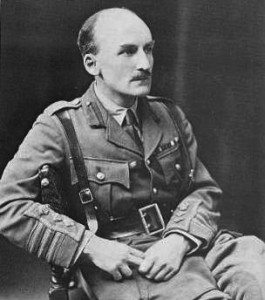Major-General J.F.C. Fuller (1878 – 1966) was a celebrated military tactician and theorist, an  international expert on the use of tanks in warfare who was a strong influence on the German tactician Guderian, but also a Nazi sympathizer who met Hitler, and the only top-ranking officer in the British Army who in 1939 was not invited to join the fight against the Fuhrer. Nicknamed ‘ Boney ‘ by his peers presumably for his combative mien and brilliance as a strategist, and indeed height ( he was only 5’ 4”) Fuller was disliked by many for his high-handedness and argumentative nature. But some of this unpopularity may also have had its origin in his devotion to the occult, on which he wrote articles and books, including a study of Aleister Crowley. Indeed we at Jot 101 first came across his name in the April 1926 issue of The Occult Review, where he contributed a long article entitled ‘ The Black Arts ‘.
international expert on the use of tanks in warfare who was a strong influence on the German tactician Guderian, but also a Nazi sympathizer who met Hitler, and the only top-ranking officer in the British Army who in 1939 was not invited to join the fight against the Fuhrer. Nicknamed ‘ Boney ‘ by his peers presumably for his combative mien and brilliance as a strategist, and indeed height ( he was only 5’ 4”) Fuller was disliked by many for his high-handedness and argumentative nature. But some of this unpopularity may also have had its origin in his devotion to the occult, on which he wrote articles and books, including a study of Aleister Crowley. Indeed we at Jot 101 first came across his name in the April 1926 issue of The Occult Review, where he contributed a long article entitled ‘ The Black Arts ‘.
In the piece Fuller agued that throughout time people bewildered by the mysteries of life and death have sought meaning and comfort in spiritual systems. Many of the less curious, and less intelligent, he contended, have turned to conventional religions that encourage ‘ pauperization of thought ‘ while the more adventurous and intellectually inclined looked for answers in what others have regarded as evil forces allied to Satan. However, these occult resources, argued Fuller, were not reservoirs of evil at all, but were in the hands of practitioners like Friar Bacon. Paracelsus and Dr Dee, valid paths to enlightenment and truth. Even Isaac Newton and Copernicus, Fuller contends, can be regarded as ‘black magicians’.
And as the age of ‘ strange spells ‘ is succeeded by the ‘Black Age of the steam epoch ‘ the anarchist arises as a rebel against the materialism of Capital; then, according to Fuller, in opposition to the rationalism of a new priesthood of Science ‘ strange forms ‘ arise in opposition—‘ spiritualism, psychical research, theosophy and all the baby prattle of “ higher thought “ ‘. To the rationalist, Fuller argues, these too are ‘black children ‘, but children that will eventually grow into ; strapping boys and girls ‘.
Lastly, Fuller contends that the latest representatives of ‘black magic ‘ are the promoters of psychoanalysis. Here is the ‘ anatomization of the mind potentized by theories in place of by panticles, mantras and spells.’ In conclusion Fuller argues that ‘ in the great heart of hearts of things unknowable, the black arts are in reality white, lucid and limpid…’
It is a clever argument and Fuller was an articulate and widely read writer. He quotes Carlyle and Arthur Machen in his article and there are echoes of William Blake in the veiled attacks on rationality and the conventional in thought. It has been suggested by one commentator that Fuller the intellectual would have been incapable of being an effective commander in the field, but his high rank would suggest otherwise. Nevertheless, it cannot be denied that his high intellect and tendency to challenge accepted norms (
and these two attributes usually go together) were not appreciated by his less intelligent fellow officers. Was it too much of a risk for the British to employ a clever Nazi sympathiser like him in the Second World War ? Perhaps we should also ask whether those British natives and the Germans who fled their country to work in the crucially important BBC-run Listening Centre at Evesham were all totally committed to the war effort.
In Fuller’s case it seems highly probable that the stuffed shirts that ran the War Office in 1939 were, like the conventionally religious individuals mentioned by Fuller, too strongly wedded to a ‘ pauperiszation of thought ‘ to employ someone as intellectually unconventional as Fuller, despite the fact that at a time of crisis the Allied Forces needed as many good intellects as it could command.
R.M.Healey

Useful info. Lucky me I discovered your web site by accident, and I’m
shocked why this accident didn’t took place earlier!
I bookmarked it.